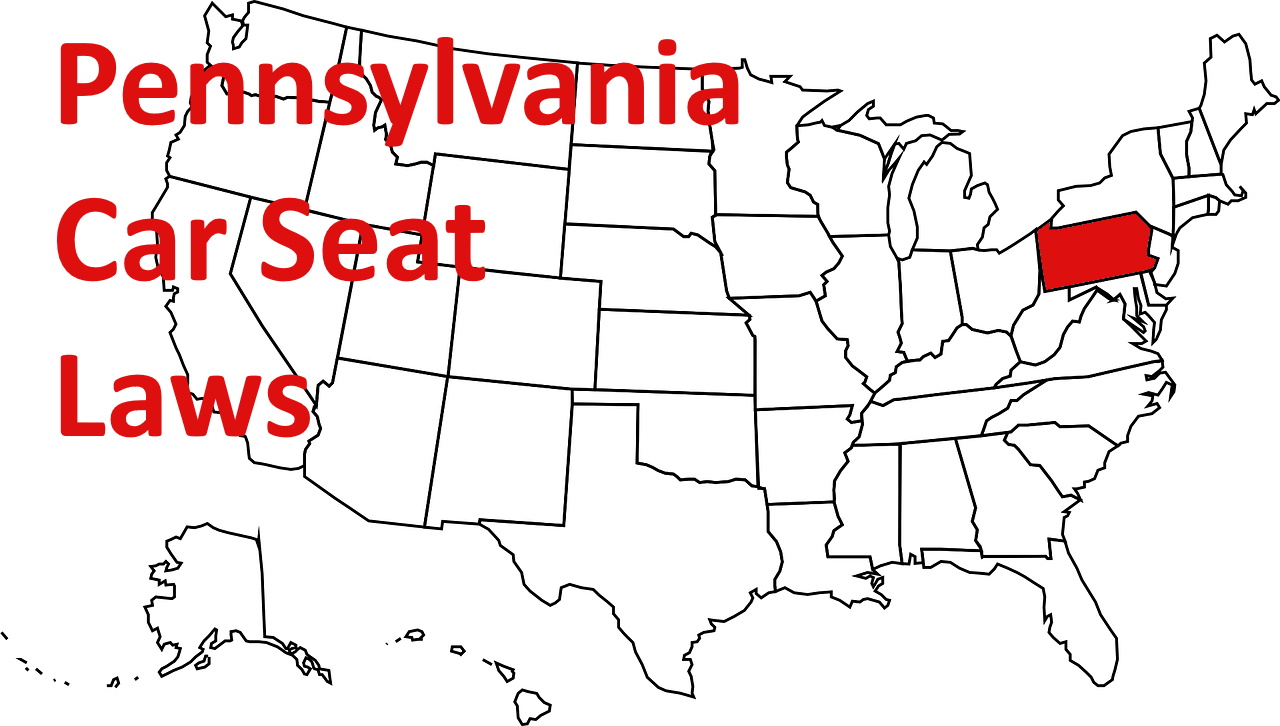Editor’s note: This article was updated in 2022 to link to a more appropriate section of the relevant statute.
In Pennsylvania law, a child under two years old must be securely fastened in a rear-facing child passenger restraint system, a child between two and three years old must be securely fastened in a child passenger restraint system, a child between four and seven years old must be securely fastened in a fastened safety seat belt system and an appropriately fitting child booster seat, and a child between eight and seventeen years old must be secured in a properly adjusted and fastened safety seat belt system when being transported in a motor vehicle equipped with seat safety belts.
Babies and Children Up to Two Years Old
A child under two years old must be securely fastened in a rear-facing child passenger restraint system meeting the Federal Motor Vehicle Safety Standard and used as designated by the manufacturer until he or she outgrows the manufacturer’s maximum weight and height limits when being transported anywhere in a passenger car, Class I or Class II truck, classic motor vehicle, antique motor vehicle, motor home, or any other motor vehicle equipped with seat safety belts.
Children Two to Three Years Old
A child between two and three years old must be securely fastened in a child passenger restraint system meeting the Federal Motor Vehicle Safety Standard and used as designated by the manufacturer when being transported anywhere in a passenger car, Class I or Class II truck, classic motor vehicle, antique motor vehicle, motor home, or any other motor vehicle equipped with seat safety belts, including the cargo area.
Children Four to Seven Years Old
A child between four and seven years old must be securely fastened in a fastened safety seat belt system and an appropriately fitting child booster seat meeting the Federal Motor Vehicle Safety Standard and used as designated by the manufacturer when being transported anywhere in a passenger car, Class I or Class II truck, classic motor vehicle, antique motor vehicle, motor home, or any other motor vehicle equipped with seat safety belts, including the cargo area. A child booster seat must be designed to elevate a child to sit properly in a federally approved safety seat belt system.
Children Eight to Seventeen Years Old
A child between eight and seventeen years old must be secured in a properly adjusted and fastened safety seat belt system when operating or being transported as a passenger in a passenger car, Class I or Class II truck, or motor home. A driver who is under eighteen years old may not operate a motor vehicle in which the number of passengers exceeds the number of available safety seat belts in the motor vehicle.
Penalties for Violations
If you operate a motor vehicle and you fail to properly restrain a child under eight years old, you may be convicted of a summary offense, fined $75.00, and your conviction may constitute a moving violation. If, prior to or at your hearing, you provide sufficient evidence that you have acquired a child passenger restraint system or child booster seat, your charges will be dismissed. Sufficient evidence includes a receipt showing purchase or rental, a notarized letter showing transfer from another child seat owner, or bailment from a bona fide loaner program, which may be mailed to the appropriate court officer.
If you operate a motor vehicle and you fail to properly restrain a child between eight and seventeen years old, or if you are under eighteen years old and you operate a motor vehicle in which the number of passengers exceeds the number of available safety seat belts in the vehicle, you may be convicted of a summary offense and fined $10.00. Your conviction will not constitute a moving violation.
Your insurer may not increase your insurance premium for a conviction for a violation of Pennsylvania’s restraint systems laws.
Exemptions
Your child may be exempt from Pennsylvania’s restraint systems laws if he or she is under eight years old and being transported in a motor vehicle where no seating position equipped with a seat safety belt or other means to secure the system is available or where no seating position was originally equipped with seat safety belts.
Your child may be exempt from Pennsylvania’s restraint systems laws if, according to the department’s rules and regulations, the use of a child passenger restraint system or child booster seat would be impractical for physical reasons including, but not limited to, medical reasons or your child’s size.
FAQ
What is Pennsylvania’s child booster seat law?
Pennsylvania car seat laws state that children between four and seven years old must be ride in a child booster seat that elevates the child to be properly secured by the vehicle’s seat belt system.
What do Pennsylvania’s car seat laws say about forward-facing car seats?
Pennsylvania child car seat law does not specify when a child can transition from a rear-facing car seat to a forward-facing car seat. Consult your manufacturer’s height and weight recommendations before securing your child in a forward-facing car seat.
When can my child ride in the front seat in Pennsylvania?
Pennsylvania car seat laws do not specify when a child can ride in the front seat of a vehicle. The Pennsylvania Department of Transportation’s website states that all children 13 and under should ride in the back seat in the appropriate child passenger restraint system for their weight and height. However, the department also states that children over 13 should also ride in the back seat because it is safer.
* Ms. Blake is licensed in the state of Maryland. The information provided in this article does not constitute legal advice and does not create an attorney-client relationship.

